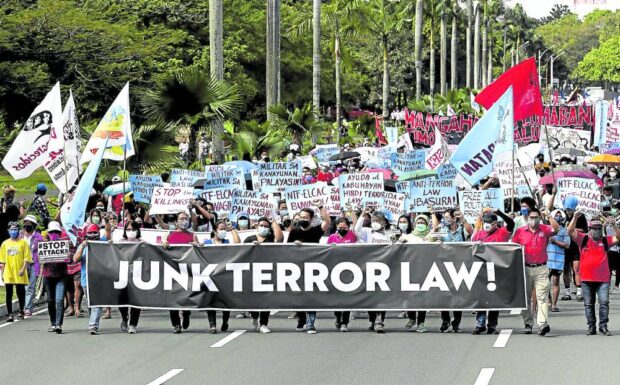Rules set by Supreme Court on anti-terrorism law to take effect Jan. 15

CALL | In this December 2021 photo, various groups gather at the University of the Philippines in Quezon City to call for the junking of the Anti-Terrorism Act of 2020 during the commemoration of International Human Rights Day. (File photo by RICHARD A. REYES / Philippine Daily Inquirer)
MANILA, Philippines — Law enforcers need to secure an order from the Court of Appeals (CA) to secretly conduct surveillance, including wiretapping of conversations, and intercepting, recording or collecting any private communications of suspected terrorist individuals or groups.
But a person suspected of committing any acts defined in the Anti-Terrorism Act (ATA) of 2020, or any member of a group, organization or association proscribed under the same law, can be arrested or detained by law enforcers without a judicial warrant of arrest, provided that their detention does not exceed the prescribed period in the Revised Penal Code.
These are among the salient points of the rules on that law, Republic Act (RA) No. 11479, and other related laws, as approved and adopted by the Supreme Court.
The “Rules on the Anti-Terrorism Act (ATA) of 2020 and Related Laws” shall apply to petitions and applications regarding detentions without judicial warrants of arrest, surveillance orders, freeze orders, restrictions on travel, designations, proscriptions, and other court issuances promulgated to implement the ATA and other related laws, according to a statement summarizing the high court resolution on the terror law.
These rules, which take effect on Jan. 15, were crafted with the help of the Ad Hoc Committee for the Formulation of the Special Rules of Procedure on Anti-Terrorism Cases, chaired by retired Chief Justice Reynato Puno.
Article continues after this advertisementMobile data
RA 11479 was signed into law by then President Rodrigo Duterte on July 3, 2020 — four months into the country’s lockdown to ease the impact of the COVID-19 pandemic.
Article continues after this advertisementAt least 37 petitions were brought before the Supreme Court to declare the law unconstitutional, making it the most contentious law to date.
But in December 2021, the high court declared RA 11479 constitutional except for two of its provisions—one of which equated protests with terrorism and another, designating individuals or groups as terrorists upon the request of local or foreign groups.
Under the rules, a law enforcement or military agent, through a written order from the Court of Appeals, may seek to compel service providers to produce all subscriber information and identification records as well as call and text data records, content and other cellular or internet metadata of any person or entity subject to surveillance.
A copy of the ex parte (for one party) application by said agent shall also be furnished, but in strict confidence, to the Commissioner of the National Telecommunications Commission.
‘Subjects or targets’
Surveillance orders will be limited, among others, to members of a judicially proscribed terrorist organization, or any person charged with or suspected of committing any of the crimes defined and penalized under the provisions of the ATA, among other “subjects or targets.”
Still, no surveillance order will be granted on any communications between lawyers and clients, doctors and patients, and journalists and their sources, as well as confidential business correspondence, the high court said.
The rules also lay down the procedure to be followed by any party seeking judicial relief from the designation of terrorist by the Anti-Terrorism Council (ATC) and any freeze order by the Anti-Money Laundering Council following such designation.
Also provided by the rules is an Order of Proscription by the CA, upon a verified petition by the Department of Justice secretary declaring as outlawed terrorist any group of persons, organization or association that commits any of the acts defined in the law.
The CA will conduct continuous summary hearings and decide the petition within three months, counted from the time it is submitted for resolution.
The Permanent Order of Proscription will be effective for a period of three years from the date of its publication, according to the rules.
Contempt
The Supreme Court emphasized that any violation of any provision of the rules or any duly-issued court order shall be a ground for contempt.
Suspected members of terrorist groups and individuals who are arrested without judicial warrants cannot be detained beyond the period provided under Article 125 of the Revised Penal Code unless authorized in writing by the ATC for a period of up to 14 days and, thereafter, by a designated regional trial court (RTC) for a period of not more than 10 days.
“Those arrested shall be informed of their constitutional rights and custodial rights under Section 30 of the ATA,” the Supreme Court said.
“The use of torture and other cruel, inhumane, and degrading treatment or punishment during investigation or interrogation is prohibited,” it added.
The rules further sets the procedure to be followed by an investigating prosecutor in applying for a precautionary hold departure order against a person suspected of violating the ATA.
To prevent the concerned parties from leaving the country, the prosecutor may file a verified application with any designated RTC under whose jurisdiction the alleged crime was committed.
The parties may also seek other remedies, such as writs of habeas corpus, amparo and habeas data, as well as appeals to the high court when appropriate, the rules said.